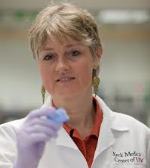
|
The Laird-Offringa laboratory is focused on identifying changes in the genetic material (DNA) of lung cancer cells, to help us understand how lung cancer develops, and to use as markers for early detection. The kind of molecular change we study is called DNA methylation. DNA methylation is a chemical modification of DNA that doesn’t change the genetic sequence, but does change the way the DNA looks to a cell. Excessive methylation leads to the silencing or inactivation of genes. In cancer cells, DNA methylation is now recognized as a key molecular mechanism for the inactivation of so-called “tumor suppressor genes”. If one thinks of the genetic material as a very thick textbook, with instructions for the cell, DNA methylation can be thought of as post-it notes stuck to the beginning of certain chapters, instructing these chapters to be skipped. The pattern of methylation, or the “methylation profile”, is not the same for all types of cancer. Thus, abnormal methylation changes could provide important insights into the changes that lead to a particular kind of cancer. In addition, they could yield powerful biomarkers that may help the detection of different kinds of cancer. Lung cancer is the leading cause of cancer death in the United States and Western Europe. Adenocarcinoma, the histological subtype most frequently seen in never smokers and former smokers, is now the most common type of lung cancer in men and women in the United States. The increasing incidence of lung adenocarcinoma and its lethal nature underline the importance of understanding the development and progression of this disease, and the need for the development of accurate tools for early diagnosis. Atypical adenomatous hyperplasia (AAH) and bronchioalveolar carcinoma (BAC), defined as non-invasive lesions, are thought to be sequential precursors along the path of progression to lung adenocarcinoma. Elucidation of the molecular changes underlying the development and progression of lung adenocarcinoma is of great importance for devising targeted drugs and methods of early detection. Ite A. Laird-Offringa, PhD., USC Norris Comprehensive Cancer Center from TEAM DRAFT on Vimeo. |
Awareness • Early Detection • Treatment • Research • Survivorship
